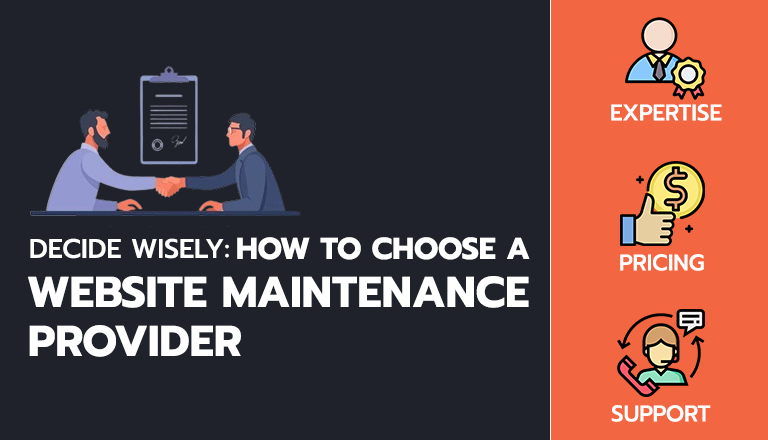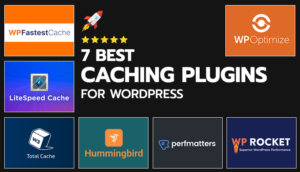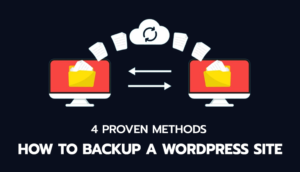Choosing the right website maintenance services provider is similar to finding a reliable mechanic for your car.
As you wouldn’t trust your vehicle with just any mechanic, your website which is a crucial asset of your business—requires a skilled and trustworthy maintenance provider.
In the online world, where first impressions matters a lot, it’s important to keep your website current, secure, and functioning smoothly. A great maintenance service doesn’t just solve problems; they also actively enhance your site’s performance and safety.
This article will help you understand what to look for in a provider, ensuring that your website runs smoothly and provides a great experience for your visitors.
Understanding the Role of a Website Maintenance Services Provider
A website maintenance provider handles crucial tasks such as regular software updates, security patching, and performance optimization. They ensure your website runs smoothly, remains secure against cyber threats, and provides a seamless user experience.
Let’s have a look at scope of services which are generally covered under a website maintenance contract.
Scope of Services
- Security Updates and Fixes: This includes applying the latest security patches and addressing vulnerabilities to protect your website from cyber threats and hacks.
- Web Performance Monitoring and Optimization: Focuses on monitoring website speed and performance, implementing strategies to enhance loading times and overall site efficiency.
- Updates to Web Content: Involves updating and optimizing website content for SEO, refreshing calls-to-action (CTAs), and fixing broken links to improve search rankings and user engagement.
- Server Maintenance: Ensures the server hosting your website is running smoothly, with regular checks and updates to prevent downtime and improve reliability.
- User Experience Optimization: Improves on-page user experience and accessibility, ensuring your website is user-friendly and accessible to all audiences. Tests your website across different browsers and devices to ensure consistent functionality and appearance.
- Regular Files and Database Backup: Conducts routine backups of your website’s files and databases to safeguard against data loss in case of a malfunction or cyberattack.
- Emergencies (Unplanned Outages or Hacking): Provides immediate response and support during emergencies like website outages or security breaches, minimizing downtime and mitigating damage.
- eCommerce Optimization: Specifically focuses on optimizing the checkout process and other aspects of eCommerce websites to enhance user experience and increase conversion rates.
Key Factors to Consider When Choosing a Website Maintenance Services Provider
When selecting a website maintenance provider, several critical aspects should be considered to ensure you choose a partner that aligns with your website’s needs and goals.
1. Experience and Expertise
Look for providers with proven experience in your industry, as they’ll better understand your specific challenges and requirements. Also, take time to evaluate their technical expertise, especially in areas which are critical to your website’s performance, such as security protocols, SEO optimization, and coding skills.
2. Service Offerings and Specialization
Do they offer a comprehensive package, or are their services limited? A provider that offers a full range of services can be a one-stop-shop for all your maintenance needs.
If your website is built on a specific platform like WordPress or Shopify then consider providers who specialize in those ecosystems for targeted expertise.
3. Client Testimonials and Case Studies
Review client testimonials and case studies to gauge the provider’s effectiveness and customer satisfaction levels. Success stories can provide insights into their problem-solving capabilities and the impact of their services. You should also check online reviews and ask for client references to validate their reliability and service quality. Pay attention to feedback regarding their responsiveness, problem-solving skills, and overall client support.
4. Support and Communication
Make sure the provider gives full support, including help in emergencies. See if they have a special team for customer service and when they’re available to help.
It’s important to check how well the provider communicates. Do they offer multiple channels (email, phone, chat) for communication? Evaluate their responsiveness to inquiries and support requests, as timely communication is crucial in maintenance scenarios.
5. Pricing Structures and Transparency
Providers may offer various pricing structures, such as monthly subscriptions, annual plans, or pay-as-you-go services. Compare different models to understand which offers the best value for your specific needs.
Be aware of any hidden costs like setup fees, additional services charges, or penalties. Ensure transparency in pricing to avoid any unexpected expenses.
Conclusion
Selecting the right website maintenance services provider is a crucial decision that impacts the health and performance of your website.
Look for a provider who not only offers comprehensive maintenance services but also aligns with your business’s specific goals and needs.
A reliable maintenance partnership ensures your website remains secure, efficient, and up-to-date, contributing to its overall success.
Remember, the right provider is not just a service, but a partner in your website’s journey towards success.
Comprehensive FAQ Section
Here we’ll address some frequently asked questions about choosing a website maintenance services provider:
- What are the typical pricing models for website maintenance services?
Common models include monthly or annual subscriptions, customized plans based on services, or hourly rates for ad-hoc tasks. - Can I maintain my website myself?
While it’s possible to manage some aspects of website maintenance yourself, professional services ensure comprehensive care, including handling complex issues that require technical expertise. - What is the onboarding process like when working with a new maintenance provider?
Typically, it involves an initial website assessment, understanding your specific needs, and setting up a service plan. - Can I switch providers if I am not satisfied with the services?
Yes, but ensure you understand any contractual obligations or termination fees involved in switching providers. - Will website maintenance affect my site’s uptime?
Good maintenance providers typically schedule updates and maintenance during low-traffic periods to minimize downtime.






Share Your Thoughts: